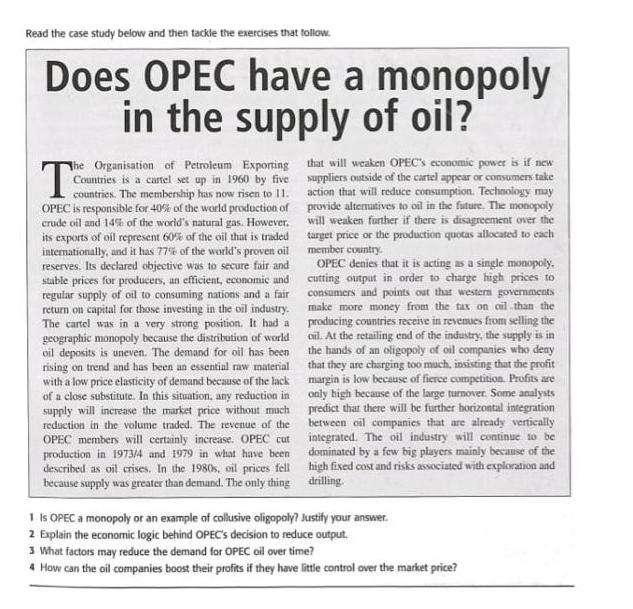Answered step by step
Verified Expert Solution
Question
1 Approved Answer
Read the case study below and then tackle the exercises that follow. Does OPEC have a monopoly in the supply of oil? T The

Read the case study below and then tackle the exercises that follow. Does OPEC have a monopoly in the supply of oil? T The Organisation of Petroleum Exporting Countries is a cartel set up in 1960 by five countries. The membership has now risen to 11. OPEC is responsible for 40% of the world production of crude oil and 14% of the world's natural gas. However, its exports of oil represent 60% of the oil that is traded internationally, and it has 77% of the world's proven oil reserves. Its declared objective was to secure fair and stable prices for producers, an efficient, economic and regular supply of oil to consuming nations and a fair return on capital for those investing in the oil industry. The cartel was in a very strong position. It had a geographic monopoly because the distribution of world oil deposits is uneven. The demand for oil has been rising on trend and has been an essential raw material with a low price elasticity of demand because of the lack of a close substitute. In this situation, any reduction in supply will increase the market price without much reduction in the volume traded. The revenue of the OPEC members will certainly increase. OPEC cut production in 1973/4 and 1979 in what have been described as oil crises. In the 1980s, oil prices fell because supply was greater than demand. The only thing that will weaken OPEC's economic power is if new suppliers outside of the cartel appear or consumers take action that will reduce consumption. Technology may provide alternatives to oil in the future. The monopoly will weaken further if there is disagreement over the target price or the production quotas allocated to each member country. OPEC denies that it is acting as a single monopoly. cutting output in order to charge high prices to consumers and points out that western governments make more money from the tax on oil than the producing countries receive in revenues from selling the ail. At the retailing end of the industry, the supply is in the hands of an oligopoly of oil companies who deny that they are charging too much, insisting that the profit margin is low because of fierce competition. Profits are only high because of the large turnover. Some analysts predict that there will be further horizontal integration between oil companies that are already vertically integrated. The oil industry will continue to be dominated by a few big players mainly because of the high fixed cost and risks associated with exploration and drilling. 1 Is OPEC a monopoly or an example of collusive oligopoly? Justify your answer. 2 Explain the economic logic behind OPEC's decision to reduce output. 3 What factors may reduce the demand for OPEC oil over time? 4 How can the oil companies boost their profits if they have little control over the market price?
Step by Step Solution
★★★★★
3.58 Rating (151 Votes )
There are 3 Steps involved in it
Step: 1
1 OPEC can be considered as an example of a collusive oligopoly rather than a monopoly A monopoly exists when a single entity has exclusive control over a market whereas an oligopoly is characterized ...
Get Instant Access to Expert-Tailored Solutions
See step-by-step solutions with expert insights and AI powered tools for academic success
Step: 2

Step: 3

Ace Your Homework with AI
Get the answers you need in no time with our AI-driven, step-by-step assistance
Get Started


